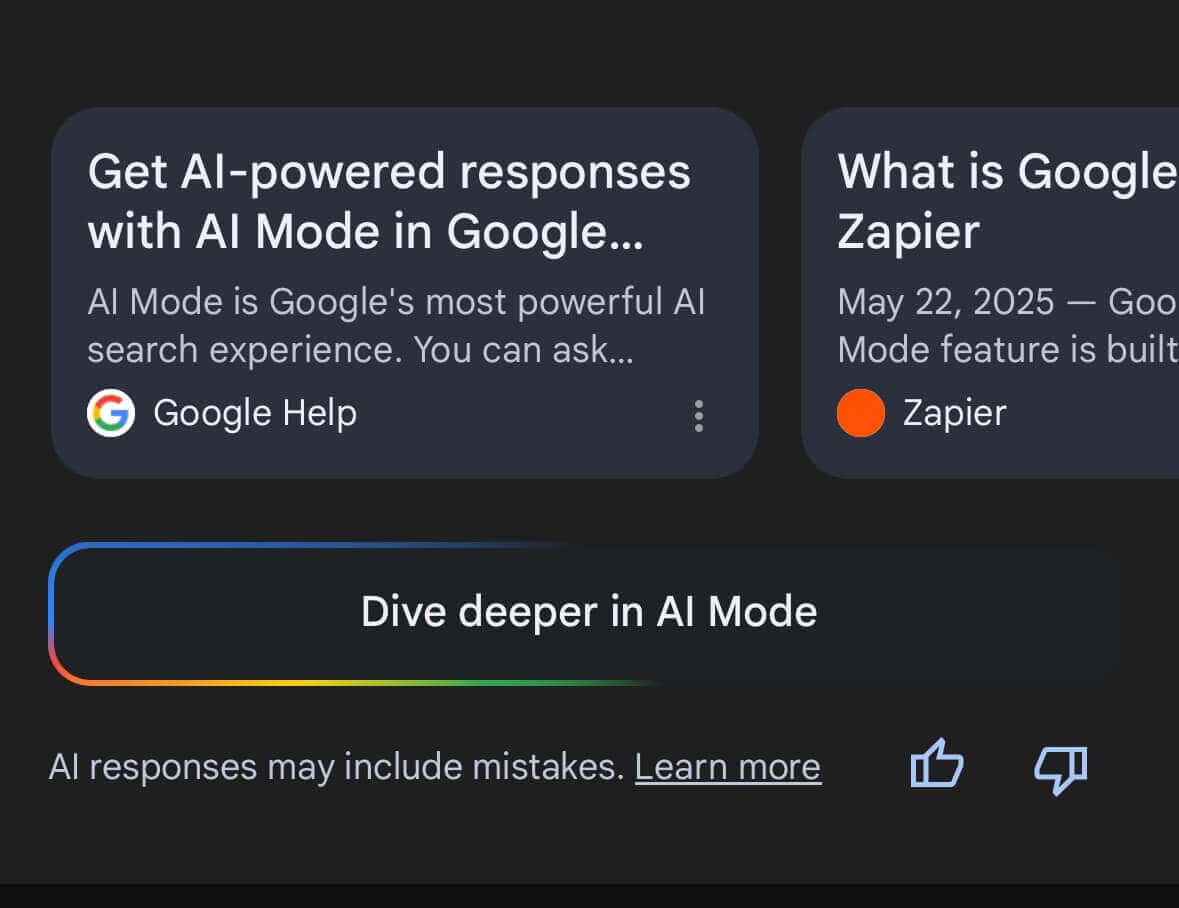This morning, I happened to use Safari on my iPhone to search for something. As with most users who have an iPhone, Google is my default search engine.
During my search, I saw an AI Overview. This has been showing up more and more for infornational searches recently.
Nothing new so far.
But as I expanded in the "show more" button, something caught my eye.
Google added a new button called "Dive Deeper in AI Mode."
Naturally this got me curious.
AI Mode Is Everywhere Now
AI Mode started out as a search labs feature where you needed to sign-up for access. This eventually changed to a no sign-up feature, then recently became publicly available.
What's new to me this time around is I was signed in to my Google Workspace account. I know this wasn't available before. It was only available on my personal Gmail account where I signed up fornit in search labs.
Next, I checked incognito, and it's still there. This tells me it has now completedly rolled out.
Perhaps the only place where I haven't seen it yet is on Google's homepage where other users reported as having a search in AI mode button there.
Nonetheless, Google's AI Mode is here.
And it's everywhere.
AI Mode = Panic Mode
Since I work in SEO, I am both anxious and excited at the same time.
See, when AI mode was introduced early this year, my first thoughts were my industry is going to change. A lot.
This hasn't happened yet but I am seeing shifts in behaviors as well as in the industry.
Perplexity has been my favorite search engine lately. That's why I havent used Google as much.
In a way, I think this will eventually be how AI Mode will become. But that's for another time.
But for the vast majority of people, Google remains the most used tool for search.
According to a recent data I read, Google handles 8-14 billion searches a day (depending on where you read) while the most popular AI tool in the market, chatGPT does ~1B searches.
What I don't know if the numbers in chatGPT are actual searches or just queries/messages.
But here's where my head is at—Google is the #1 search website. They are now introducing AI mode to the public which will significantly reduce the amount of traffic websites get.
Think about it.
If you can chat longer, which is what AI Mode offers, there would be no more need to visit the site, or any website for that matter. Whether they are linked or mentioned, it won't matter anymore.
And that is the first reason and impact on the SEO industry…
AI Mode Will Reduce Users Clicking Through a Website
Looking at my own behavior when I use Perplexity, I rarely go in and click on the sources anymore. In the beginning, yes, I was checking whether the sources were coming from credible ones. But after a while, I stopped.
All I did was refine my questions and/or followup with more prompts.
And now, Google released AI mode which means "regular people" will be doing the same thing. People who aren't in the SEO industry will be using it more and more.
Over time, this will significantly reduce the number of clicks to the websites even though they are cited.
For website owners and businesses, this represents a big shift.
Organic traffic is the single biggest source of "free" leads and customers.
While you can still get visibility, if people aren't reaching your site during that search, it's going to be difficult to convert them.
Traditional SEO metrics such as keyword rankings, click-through rates and organic traffic are all going to be negatively affected.
That means as a business, you need to find other ways to reach your audience.
And for many small businesses, venturing into other channels like paid or social media requires an entirely different approach.
Side note: this is already true to some extent. Just search for "zero click searches" and it is becoming more and more prominent.
This now leads us to the second impact on the SEO industry…
SEOs Will Need to Focus on SEO, Not SEO
I couldn't resist, I had to make a play on words.
SEOs (people in the industry) needs to start thinking more broadly. We need to start thinking about Search Everywhere Optimization instead of Search Engine Optimization.
This has been a shift that is becoming more clear over time—you need to be present everywhere in order to succeed as a business today.
Google has emphasized it's EEAT guidelines (formerly just EAT) over and over:
- Experience: First-hand, real-world experience with the topic.
- Expertise: Knowledge, skills, and credentials in the subject area.
- Authoritativeness: Recognized authority or reputation in the field.
- Trustworthiness: Reliability and integrity of the content and its source.
This makes it extremely difficult for agencies and third parties to do at scale. They'd need industry specializatiom in order to really showcase this.
Even with the use of AI, industry knowledge cannot be replicated. You can easily write long-technical content, optimize them for semantic search, and follow all the best practices of SEO—but industry experience and know-how is something only those who work inside the industry or take the time to study it can replicate.
And if you're on the client-side, you can't do this willy-nilly too.
The impact the rollout of AI Mode will have on SEOs means our scope of work needs to expand as well.
We cannot raise our hands in the air and just say, "nope, not my problem."
Remember, as consumer search behavior changes, i.e. no longer clicking through as mentioned above, organic traffic will tank.
Over time, this channel won't be the same way it was.
When there's mass adoption for AI, which is certainly possible because of Google's AI Mode, what SEOs use to work and report on will all change.
As for how long or when that will happen, I don't know.
What I do know is I'm not waiting to be displaced nor hope I won't be affected.
I urge you to do the same.
Content Creation Must Match Content Consumption
A niche industry in SEO is growing—it's called Generative Engine Optimization (GEO). Others call is LLMO (large language models optimization). But whatever you want to use, this new industry operates on the fact that AIs or LLMs use more conversational copy as opposed to keyword-rich searches in traditional SEO.
This is actually one of the most actionable tasks you can do today for your website and content.
However, beyond that, the way you optimize and write content needs to match the new behavior that AI Mode (and other AIs) is shaping.
For instance, the Q&A format I just mentioned above is one.
Focusing on real questions people ask, instead of keyword-specific, would work best. This is one of the behaviors that are slowly shifting. AI searches are more complex, often reaching 15 words or more whereas majority of traditional searches are only 3-4 words long.
Formatting is also key. Today, large language models access content in smaller chunks. Tokens, at the moment, remain the most prominent limiting factor. That's why organizing content that can be easily read and understood by AI is also important.
Perhaps the biggest factor I'm foreseeing happening is the emphasis on industry-insider knowledge. This is going back to EEAT guidelines again. The more "brand authority" you can build, the better. With generative AI, it's easy to create content. But only "trustworthy" brands are most often cited by AI.
I believe that building a trustworthy brand is going to be the most crucial aspect for search in the AI era.
As I reflect more on how I use AI, I constantly refine my prompts to find "hidden gems" or nuggets of information I can't find easily.
Because AI Mode (and other AI tools) allow for more follow-ups without losing context or history, the entire search evolves. Think of it as having a dialogue with any expert in any field.
A good analogy I can think of right now is a visit to your doctor. She is explaining your most recent blood results. You ask what this means, then you follow up with more questions based on your medical history and other information such as current symptoms.
This entire "search" is personal and highly relevant only to you.
That's the promise of AI search.
And no, I'm not advocating you should be using AI to figure out your own symptoms and health problems (or legal issues or other topics requiring professional help). What I'm saying is this conversational nature changes the way we interact with content, which in turn, should also change how we write or create them as marketers.
The conversational nature AI searches encourages deeper exploration – users don’t reformulate the searches. They build on previous answers to find edge cases and specific scenarios.
These “hidden gems” represent huge SEO opportunities because:
1. Zero competition: Most content doesn’t address these nuanced scenarios
2. High conversion potential: People asking specific follow-ups are closer to taking action
3. Authority building: Answering complex edge cases establishes expertise
And the only way to execute this is by taking the time to really think through the questions and providing insider knowledge to stand.
AI Mode and the Future of SEO
The public release of AI Mode by Google will affect traditional search engine optimization as we know it. Metrics such as traffic, keyword rankings , and click-through rates will start to become obsolete. This means we need to change the way we approach SEO. We must move beyond a single channel approach and focus more on providing better user experience through Search Everywhere Optimization instead.
The rising popularity of AI have recently led to the growth of Generative Engine Optimization. This represents the start of an evolution as consumer's search behavior continues to change.
As with most things, SEOs need to adapt or risk becoming obsolete.
What do you think? I'm curious what your thoughts are on this topic. Let me know in the comments below.


